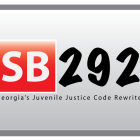Kids – Not Parents – Get to Call the Shots in Court Under New Code
|
Parents are not always the best advocates for children charged with crimes. In fact, parents may be uninvolved, absent, or even hostile, experts told state senators as they discussed proposed changes to Georgia’s juvenile code. Some of those experts were young people who’ve been through the juvenile justice system. They are identified by first names only:
Giovan, 20, was only 11 months old when he entered foster care. By 12, he was also in the juvenile justice system, declared unruly for cursing at foster parents he says repeatedly told him he was worth nothing.

